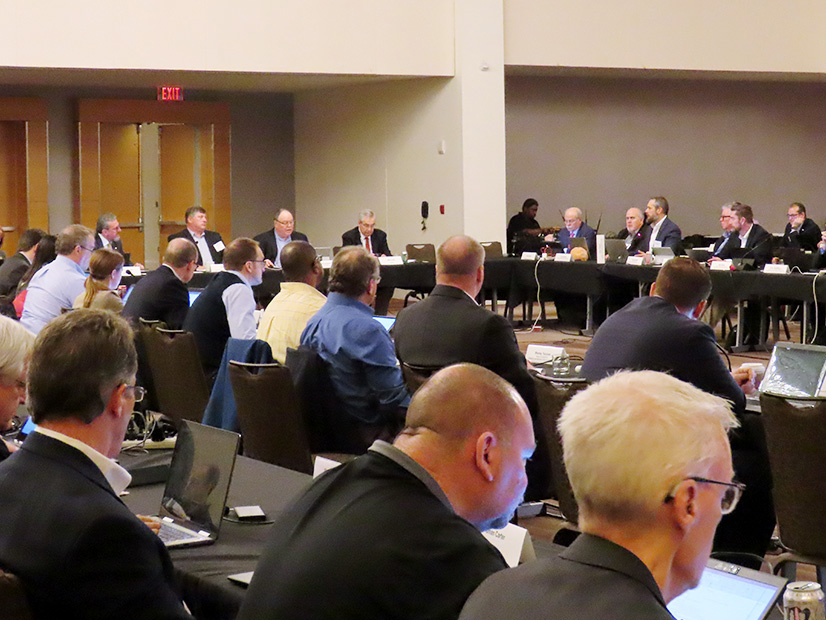
Committee to Meet Face-to-face in September
NERC’s Reliability and Security Technical Committee (RSTC) plans to hold its next meeting in person in Atlanta, though the venue has not been chosen yet, committee leaders told attendees at its June meeting held via conference call on Wednesday and Thursday.
RSTC members have not met face-to-face since the committee’s first meeting, a short gathering in Atlanta in March 2020 at which attendees mainly discussed how to take over the business of the now defunct Planning, Operating and Critical Infrastructure Protection committees. (See RSTC Tackles Organization Issues in First Meeting.) The committee had planned to hold its first meeting of 2022 in person, but it was converted to a virtual gathering before the December conference call.
In that meeting, Secretary Stephen Crutchfield did not mention the change specifically but said the September gathering was “the only one [for which] we had a hotel booked currently.” On Thursday, Crutchfield said the meeting has changed from that location, the Grand Hyatt Atlanta in Buckhead, for unspecified reasons; however, he said NERC staff are “working on getting a new location” and that the committee does not intend to convert it to a conference call again.
December’s meeting is still being envisioned as virtual, but on Thursday, Edison Elizeh of the Bonneville Power Administration suggested that this gathering be held in person too, in light of the decision to cancel the physical meeting in April. Crutchfield said the RSTC executive committee plans to consider this at its upcoming meeting next Tuesday; NERC staff asked that attendees advise as to their ability to travel that month in light of “end-of-year responsibilities and the holiday.”
SARs Move to Standards Committee
Committee members endorsed two standard authorization requests (SARs) authored by NERC’s Energy Reliability Assessment Task Force on Wednesday. The goal of the project is to update NERC’s reliability standards (either by creating new standards or modifying existing ones) to require registered entities to perform energy reliability assessments in order to evaluate energy assurance and to develop corrective action plans to address any identified risks. The SARs will now be submitted to NERC’s Standards Committee for approval.
However, another SAR — proposed by the Inverter-based Resource Performance Working Group (IRPWG) to modify standard EOP-004-4 (Event reporting) to address a flaw identified in a report on the July 2020 San Fernando Disturbance — was rejected by the committee.
The incident involved a widespread reduction of active power from solar facilities across a large geographic area; the report’s authors said that EOP-004-4’s event-reporting requirements are intended for large synchronous generating resources and don’t address scenarios in which generation losses at a number of small facilities add up to a large loss.
Presenting the SAR to the committee, the IRPWG’s Julia Matevosyan said the goal is to “ensure that future events that are similar to already-experienced [solar] events … would be captured by this [new] generation loss criteria.”
Attendees expressed discomfort at the SAR’s proposal to make reliability coordinators responsible for reporting the relevant generation loss data. The SAR justified this suggestion on the grounds that RCs “are best suited for identifying widespread events … involving solar PV and wind resources [and] are also able to coordinate with [neighbors] to identify if the loss of resources spans across multiple footprints.” But Duke Energy’s Greg Stone, in comments that were echoed by other speakers, said this idea would put the burden on the wrong stakeholders.
“The RCs … are reliability coordinators, not reporting coordinators,” Stone said. “Given the commentary that we got in [Matevosyan’s] presentation that the collection and submission of this data is already problematic, we don’t need to be putting the RCs in the middle of that and especially create a compliance burden for the RCs to go hunt this down after the fact. … Put the burden of reporting the data on the people who have the data, and don’t put another function in the middle of that.”
While 17 of the 30 RSTC members in attendance voted to endorse the SAR, with 11 voting against it, the committee’s rules require a two-thirds majority for an item to be considered approved. As a result, the proposal failed. Receiving the RSTC’s endorsement is not technically required to proceed with a standards development project, but Matevosyan agreed to take the SAR back to the IRPWG and modify it based on committee members’ feedback.
Procedural Confusion on EMT SAR
The RSTC’s rules created some confusion around another SAR intended to ensure that transmission planners and planning coordinators “have accurate models necessary to adequately conduct reliability assessments under increasing levels of inverter-based resources” by requiring TPs and PCs to conduct electromagnetic transient (EMT) studies during the interconnection study process and annual planning assessments.
The vote on endorsement initially appeared to fail to meet the two-thirds threshold, with 19 votes in support out of 30 recorded. But committee staff pointed out that under RSTC rules, abstentions are not counted as votes cast — therefore, the three abstentions should be left out of the total. After this subtraction, the eight votes against endorsement were not sufficient to carry the field.
This decision led to several minutes of discussion over the procedural implications of the rule; while no members disputed the result of the vote, several said that the existence of an “abstain” option in Slido, the voting software used by the committee, was at least an implication that votes other than yes or no were possible. Staff agreed to change the options in Slido, renaming “abstain” to “present,” in hopes of preventing further misunderstandings.



